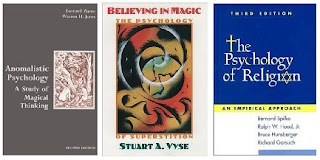
I enjoy my literature review on superstition a lot. I have been reading these books and an immediate sense I get is that there is a difficulty to pin down what it is as there is no way to differentiate superstition from other belief and action. On whose authority do we take a belief or an attitude to be superstitious? If we turn to religious authority, there is a continuing debate whether superstition can be distinguished from religion or is the latter itself, as Cattell puts it, just “silly superstition”. If we turn to science, experts often have different opinions and even if scientific community can come to a consensus, other group may not necessarily agree with them. If we leave to “the reasonable man in present-day Western society” or the consensus of the educated people to decide what superstitious belief is, we cannot avoid complicating the debate with cultural and historical issues. I know that it is beyond my paper to enlighten how superstition should be defined. For the aims of my paper, I think it is best to stay away from the above contentious areas and settle with Zusne & Jones’ (1989) definition that superstition is a “(a) specific, circumscribed belief or act that (b) involves magical thinking, either actually or as a remnant, held or engaged in because (c) it is culturally transmitted or learned through fortuitous reinforcement and (d) is resorted to under conditions of uncertainty. To act on a superstition is to become momentarily a magician on a small scale” (pg. 242).
More reading and writing for now...


Dear Shinelight,
ReplyDeleteYour last post interested me, especially the definition of "superstition" you have alluded to. I do understand your reservation about delving into contentious issues. However, I reckon there would be no running away from it in this study. This very definition you have chosen needs unpacking in so many ways, it appears. What is 'magic'? What then is 'magical thinking'? In what ways is magical thinking treated or classified as a "remnant"? And Zusne and Jones (1989) overtly suggest that there is no running away from it as it is resorted to "under conditions of uncertainty". None of us can be said to be immune to "conditions of uncertainty" and therefore moments of magical thinking. Back to Square One - What is 'magic'and 'magical thinking'?
This was the way my train of thoughts took me and I am sharing that with you. Do throw in some luminous rays to elucidate the matter further, at least for my brains to understand.
I like the ground you are treading now.....really out of the beaten track...keep going...
Cheers
Jayanthy
Jayanthy, you comment brightens up my mood today. :) Zillions thanks for that!^^
ReplyDeleteThank you also for highlighting the need to include the definitions of "magic" and "magical thinking", else I could have missed them altogether in my paper. I realize that I need to defend my claim that the two practices in MMOG that I am studying about can be considered superstitious and having a definition what magical thinking is, will help a lot.
Btw, superstitions in MMOG is not my PhD topic. It is meant to be a pilot study to test the ground for my PhD study and to support claims and conjectures that I make in some parts of my dissertation.
Cheers, SL